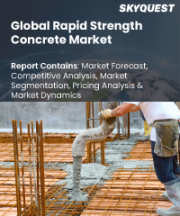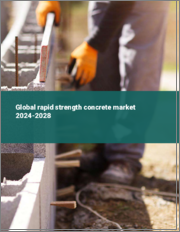
|
시장보고서
상품코드
1702115
조강 콘크리트 시장 보고서 : 강도, 용도, 지역별(2025-2033년)Rapid Strength Concrete Market Report by Strength (0 To 40 MPa, 40 To 80 MPa, Above 80 MPa), Application (Airport, Building Floor, Dockyard, Formed Work, Parking Areas, Rail Network, Roads and Bridges, and Others), and Region 2025-2033 |
||||||
2024년 세계 조강 콘크리트 시장 규모는 1,512억 달러에 달했습니다. 향후 시장은 2033년까지 2,230억 달러에 달하고, 2025-2033년 연평균 성장률(CAGR)은 4.19%를 보일 것으로 예측됩니다.
RSC(Rapid Strength Concrete)는 빠르게 강도를 증가시키고 구조물의 남은 수명을 위해 지속적인 수리를 제공하는 콘크리트의 일종으로, 고품질의 재료와 배합 설계를 통해 제조되기 때문에 기존 콘크리트에 비해 많은 장점을 가지고 있습니다. 자본 지출을 절감할 수 있도록 도와주기 때문에 전 세계 공항, 조선소, 주차장, 철도망 등에서 널리 사용되고 있습니다.
조강 콘크리트 시장 동향 :
세계적으로 현대 건축에 대한 수요가 증가하고 있는 것은 시장 성장을 가속하는 중요한 요인 중 하나입니다. 이와 더불어, 포장 도로의 보수 및 재건에 RSC를 사용하는 사례도 상당히 증가하고 있습니다. 이러한 포장은 자동차, 트럭, 버스, 버스, 자전거, 통근자, 통근자, 상업용 차량 운송업체, 배송업체, 서비스업체, 지역 주민, 레저 여행객에게 부드럽고 내구성이 뛰어난 전천후 주행 표면을 제공합니다. 또한, 도로는 국가 도로망에서 매우 중요한 역할을 하며, 학교, 서비스, 사무실, 일반 이동 수단으로의 접근과 같은 사회적 편익을 제공합니다. 이와는 별도로, RSC는 단기간에 개통 강도에 도달하기 때문에 슬래브 교체는 하룻밤 만에 완료됩니다. 그 결과 데크, 교각, 교각, 기둥 등 건축물과 교량 하부 구조의 다양한 요소의 보수에 활용되고 있습니다. 또한, 주요 기업들은 차세대 지속 가능한 시멘트를 개발하여 콘크리트 제조가 환경에 미치는 영향을 최소화하는 데 주력하고 있습니다. 또한, 국내 기업과의 제휴 및 인수합병(M&A)을 통해 시장에 긍정적인 영향을 미치고 있습니다. 또한, 많은 국가의 행정 당국이 고속도로 및 고속도로 건설을 위한 새로운 프로젝트를 도입하고 있으며, 이는 시장 성장을 가속하고 있습니다.
본 보고서에서 다룬 주요 질문
- 2024년 세계 조강 콘크리트 시장 규모는?
- 2025-2033년 세계 조강 콘크리트 시장의 예상 성장률은?
- 세계 조강 콘크리트 시장을 이끄는 주요 요인은?
- 코로나19가 전 세계 조기강철콘크리트 시장에 미치는 영향은?
- 세계 조강 콘크리트 시장의 용도별 시장 현황은?
- 세계 조강 콘크리트 시장의 주요 지역은?
- 세계 조강 콘크리트 시장의 주요 기업은?
목차
제1장 서문
제2장 조사 범위와 조사 방법
- 조사 목적
- 이해관계자
- 데이터 소스
- 1차 정보
- 2차 정보
- 시장 추정
- 보텀업 접근
- 톱다운 접근
- 조사 방법
제3장 주요 요약
제4장 서론
- 개요
- 주요 업계 동향
제5장 세계의 조강 콘크리트 시장
- 시장 개요
- 시장 실적
- COVID-19의 영향
- 시장 예측
제6장 시장 분석 : 힘별
- 0-40MPa
- 40-80MPa
- 80MPa 이상
제7장 시장 분석 : 용도별
- 공항
- 건물 플로어
- 조선소
- 성형 작품
- 주차장
- 철도망
- 도로 및 다리
- 기타
제8장 시장 분석 : 지역별
- 북미
- 미국
- 캐나다
- 아시아태평양
- 중국
- 일본
- 인도
- 한국
- 호주
- 인도네시아
- 기타
- 유럽
- 독일
- 프랑스
- 영국
- 이탈리아
- 스페인
- 러시아
- 기타
- 라틴아메리카
- 브라질
- 멕시코
- 기타
- 중동 및 아프리카
- 시장 내역 : 국가별
제9장 SWOT 분석
- 개요
- 강점
- 약점
- 기회
- 위협
제10장 밸류체인 분석
제11장 Porter의 Five Forces 분석
- 개요
- 바이어의 교섭력
- 공급 기업의 교섭력
- 경쟁 정도
- 신규 진출업체의 위협
- 대체품의 위협
제12장 가격 분석
제13장 경쟁 구도
- 시장 구조
- 주요 기업
- 주요 기업 개요
- Aggregate Industries(Holcim Group)
- Boral Limited
- Bostik(Arkema S.A.)
- Buzzi Unicem SpA
- Cemex S.A.B. de C.V.
- CTS Cement Manufacturing Corporation
- Fosroc Inc.(JMH Group)
- Instarmac Group PLC
- Short Load Concrete Inc.
- Sika AG
- Tarmac(CRH plc)
- Westbuild Group
The global rapid strength concrete market size reached USD 151.2 Billion in 2024. Looking forward, the market is expected to reach USD 223.0 Billion by 2033, exhibiting a growth rate (CAGR) of 4.19% during 2025-2033.
Rapid strength concrete (RSC) refers to a type of concrete that gains strength quickly and provides a lasting repair for the remaining service life of a structure. It is manufactured using high-quality ingredients and mixture designs and consequently offers numerous advantages over conventional concrete. As it helps businesses operating in the construction sector reduce their capital expenditure, RSC finds extensive applications in airports, dockyards, parking areas, and railway networks across the globe.
Rapid Strength Concrete Market Trends:
The rising demand for modern architecture around the world represents one of the key factors bolstering the growth of the market. Besides this, there is a considerable increase in the use of RSC for pavement rehabilitation and reconstruction. These pavements provide a smooth and durable all-weather traveling surface to cars, trucks, buses, bicycles, commuters, commercial motor carriers, delivery and service providers, local users, and leisure travelers. In addition, they play a pivotal role in the roadway network of a country and offer societal benefits, such as access to schools, services, offices, and general mobility. Apart from this, as RSC reaches opening strength in a short period, slab replacement can be accomplished overnight. Consequently, it is utilized for repairing different components of buildings and substructure elements on bridges, such as decks, piers, and columns. Moreover, key players are focusing on minimizing the impact of producing concrete on the environment by developing next-generation sustainable cement. They are also engaging in collaborations and mergers and acquisitions (M&A) with domestic players, which is positively influencing the market. Furthermore, governing authorities of numerous countries are introducing new projects for constructing highways and freeways, which is facilitating the growth of the market.
Key Market Segmentation:
Breakup by Strength:
- 0 To 40 MPa
- 40 To 80 MPa
- Above 80 MPa
Breakup by Application:
- Airport
- Building Floor
- Dockyard
- Formed Work
- Parking Areas
- Rail Network
- Roads and Bridges
- Others
Breakup by Region:
- North America
- United States
- Canada
- Asia-Pacific
- China
- Japan
- India
- South Korea
- Australia
- Indonesia
- Others
- Europe
- Germany
- France
- United Kingdom
- Italy
- Spain
- Russia
- Others
- Latin America
- Brazil
- Mexico
- Others
- Middle East and Africa
Competitive Landscape:
The competitive landscape of the industry has also been examined along with the profiles of the key players being Aggregate Industries (Holcim Group), Boral Limited, Bostik (Arkema S.A.), Buzzi Unicem SpA, Cemex S.A.B. de C.V., CTS Cement Manufacturing Corporation, Fosroc Inc. (JMH Group), Instarmac Group PLC, Short Load Concrete Inc., Sika AG, Tarmac (CRH plc) and Westbuild Group.
Key Questions Answered in This Report
- 1.What was the size of the global rapid strength concrete market in 2024?
- 2.What is the expected growth rate of the global rapid strength concrete market during 2025-2033?
- 3.What are the key factors driving the global rapid strength concrete market?
- 4.What has been the impact of COVID-19 on the global rapid strength concrete market?
- 5.What is the breakup of the global rapid strength concrete market based on the application?
- 6.What are the key regions in the global rapid strength concrete market?
- 7.Who are the key players/companies in the global rapid strength concrete market?
Table of Contents
1 Preface
2 Scope and Methodology
- 2.1 Objectives of the Study
- 2.2 Stakeholders
- 2.3 Data Sources
- 2.3.1 Primary Sources
- 2.3.2 Secondary Sources
- 2.4 Market Estimation
- 2.4.1 Bottom-Up Approach
- 2.4.2 Top-Down Approach
- 2.5 Forecasting Methodology
3 Executive Summary
4 Introduction
- 4.1 Overview
- 4.2 Key Industry Trends
5 Global Rapid Strength Concrete Market
- 5.1 Market Overview
- 5.2 Market Performance
- 5.3 Impact of COVID-19
- 5.4 Market Forecast
6 Market Breakup by Strength
- 6.1 0 To 40 MPa
- 6.1.1 Market Trends
- 6.1.2 Market Forecast
- 6.2 40 To 80 MPa
- 6.2.1 Market Trends
- 6.2.2 Market Forecast
- 6.3 Above 80 MPa
- 6.3.1 Market Trends
- 6.3.2 Market Forecast
7 Market Breakup by Application
- 7.1 Airport
- 7.1.1 Market Trends
- 7.1.2 Market Forecast
- 7.2 Building Floor
- 7.2.1 Market Trends
- 7.2.2 Market Forecast
- 7.3 Dockyard
- 7.3.1 Market Trends
- 7.3.2 Market Forecast
- 7.4 Formed Work
- 7.4.1 Market Trends
- 7.4.2 Market Forecast
- 7.5 Parking Areas
- 7.5.1 Market Trends
- 7.5.2 Market Forecast
- 7.6 Rail Network
- 7.6.1 Market Trends
- 7.6.2 Market Forecast
- 7.7 Roads and Bridges
- 7.7.1 Market Trends
- 7.7.2 Market Forecast
- 7.8 Others
- 7.8.1 Market Trends
- 7.8.2 Market Forecast
8 Market Breakup by Region
- 8.1 North America
- 8.1.1 United States
- 8.1.1.1 Market Trends
- 8.1.1.2 Market Forecast
- 8.1.2 Canada
- 8.1.2.1 Market Trends
- 8.1.2.2 Market Forecast
- 8.1.1 United States
- 8.2 Asia-Pacific
- 8.2.1 China
- 8.2.1.1 Market Trends
- 8.2.1.2 Market Forecast
- 8.2.2 Japan
- 8.2.2.1 Market Trends
- 8.2.2.2 Market Forecast
- 8.2.3 India
- 8.2.3.1 Market Trends
- 8.2.3.2 Market Forecast
- 8.2.4 South Korea
- 8.2.4.1 Market Trends
- 8.2.4.2 Market Forecast
- 8.2.5 Australia
- 8.2.5.1 Market Trends
- 8.2.5.2 Market Forecast
- 8.2.6 Indonesia
- 8.2.6.1 Market Trends
- 8.2.6.2 Market Forecast
- 8.2.7 Others
- 8.2.7.1 Market Trends
- 8.2.7.2 Market Forecast
- 8.2.1 China
- 8.3 Europe
- 8.3.1 Germany
- 8.3.1.1 Market Trends
- 8.3.1.2 Market Forecast
- 8.3.2 France
- 8.3.2.1 Market Trends
- 8.3.2.2 Market Forecast
- 8.3.3 United Kingdom
- 8.3.3.1 Market Trends
- 8.3.3.2 Market Forecast
- 8.3.4 Italy
- 8.3.4.1 Market Trends
- 8.3.4.2 Market Forecast
- 8.3.5 Spain
- 8.3.5.1 Market Trends
- 8.3.5.2 Market Forecast
- 8.3.6 Russia
- 8.3.6.1 Market Trends
- 8.3.6.2 Market Forecast
- 8.3.7 Others
- 8.3.7.1 Market Trends
- 8.3.7.2 Market Forecast
- 8.3.1 Germany
- 8.4 Latin America
- 8.4.1 Brazil
- 8.4.1.1 Market Trends
- 8.4.1.2 Market Forecast
- 8.4.2 Mexico
- 8.4.2.1 Market Trends
- 8.4.2.2 Market Forecast
- 8.4.3 Others
- 8.4.3.1 Market Trends
- 8.4.3.2 Market Forecast
- 8.4.1 Brazil
- 8.5 Middle East and Africa
- 8.5.1 Market Trends
- 8.5.2 Market Breakup by Country
- 8.5.3 Market Forecast
9 SWOT Analysis
- 9.1 Overview
- 9.2 Strengths
- 9.3 Weaknesses
- 9.4 Opportunities
- 9.5 Threats
10 Value Chain Analysis
11 Porters Five Forces Analysis
- 11.1 Overview
- 11.2 Bargaining Power of Buyers
- 11.3 Bargaining Power of Suppliers
- 11.4 Degree of Competition
- 11.5 Threat of New Entrants
- 11.6 Threat of Substitutes
12 Price Analysis
13 Competitive Landscape
- 13.1 Market Structure
- 13.2 Key Players
- 13.3 Profiles of Key Players
- 13.3.1 Aggregate Industries (Holcim Group)
- 13.3.1.1 Company Overview
- 13.3.1.2 Product Portfolio
- 13.3.2 Boral Limited
- 13.3.2.1 Company Overview
- 13.3.2.2 Product Portfolio
- 13.3.2.3 Financials
- 13.3.3 Bostik (Arkema S.A.)
- 13.3.3.1 Company Overview
- 13.3.3.2 Product Portfolio
- 13.3.4 Buzzi Unicem SpA
- 13.3.4.1 Company Overview
- 13.3.4.2 Product Portfolio
- 13.3.4.3 Financials
- 13.3.5 Cemex S.A.B. de C.V.
- 13.3.5.1 Company Overview
- 13.3.5.2 Product Portfolio
- 13.3.5.3 Financials
- 13.3.5.4 SWOT Analysis
- 13.3.6 CTS Cement Manufacturing Corporation
- 13.3.6.1 Company Overview
- 13.3.6.2 Product Portfolio
- 13.3.7 Fosroc Inc. (JMH Group)
- 13.3.7.1 Company Overview
- 13.3.7.2 Product Portfolio
- 13.3.8 Instarmac Group PLC
- 13.3.8.1 Company Overview
- 13.3.8.2 Product Portfolio
- 13.3.9 Short Load Concrete Inc.
- 13.3.9.1 Company Overview
- 13.3.9.2 Product Portfolio
- 13.3.10 Sika AG
- 13.3.10.1 Company Overview
- 13.3.10.2 Product Portfolio
- 13.3.10.3 Financials
- 13.3.11 Tarmac (CRH plc)
- 13.3.11.1 Company Overview
- 13.3.11.2 Product Portfolio
- 13.3.12 Westbuild Group
- 13.3.12.1 Company Overview
- 13.3.12.2 Product Portfolio
- 13.3.1 Aggregate Industries (Holcim Group)















